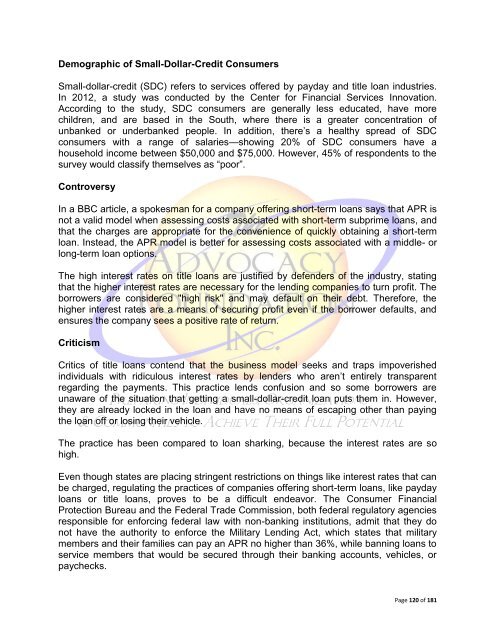Create successful ePaper yourself
Turn your PDF publications into a flip-book with our unique Google optimized e-Paper software.
Demographic of Small-Dollar-Credit Consumers<br />
Small-dollar-credit (SDC) refers to services offered by payday and title loan industries.<br />
In 2012, a study was conducted by the Center for Financial Services Innovation.<br />
According to the study, SDC consumers are generally less educated, have more<br />
children, and are based in the South, where there is a greater concentration of<br />
unbanked or underbanked people. In addition, there’s a healthy spread of SDC<br />
consumers with a range of salaries—showing 20% of SDC consumers have a<br />
household income between $50,000 and $75,000. However, 45% of respondents to the<br />
survey would classify themselves as “poor”.<br />
Controversy<br />
In a BBC article, a spokesman for a company offering short-term loans says that APR is<br />
not a valid model when assessing costs associated with short-term subprime loans, and<br />
that the charges are appropriate for the convenience of quickly obtaining a short-term<br />
loan. Instead, the APR model is better for assessing costs associated with a middle- or<br />
long-term loan options.<br />
The high interest rates on title loans are justified by defenders of the industry, stating<br />
that the higher interest rates are necessary for the lending companies to turn profit. The<br />
borrowers are considered "high risk" and may default on their debt. Therefore, the<br />
higher interest rates are a means of securing profit even if the borrower defaults, and<br />
ensures the company sees a positive rate of return.<br />
Criticism<br />
Critics of title loans contend that the business model seeks and traps impoverished<br />
individuals with ridiculous interest rates by lenders who aren’t entirely transparent<br />
regarding the payments. This practice lends confusion and so some borrowers are<br />
unaware of the situation that getting a small-dollar-credit loan puts them in. However,<br />
they are already locked in the loan and have no means of escaping other than paying<br />
the loan off or losing their vehicle.<br />
The practice has been compared to loan sharking, because the interest rates are so<br />
high.<br />
Even though states are placing stringent restrictions on things like interest rates that can<br />
be charged, regulating the practices of companies offering short-term loans, like payday<br />
loans or title loans, proves to be a difficult endeavor. The Consumer Financial<br />
Protection Bureau and the Federal Trade Commission, both federal regulatory agencies<br />
responsible for enforcing federal law with non-banking institutions, admit that they do<br />
not have the authority to enforce the Military <strong>Lending</strong> Act, which states that military<br />
members and their families can pay an APR no higher than 36%, while banning loans to<br />
service members that would be secured through their banking accounts, vehicles, or<br />
paychecks.<br />
Page 120 of 181

















